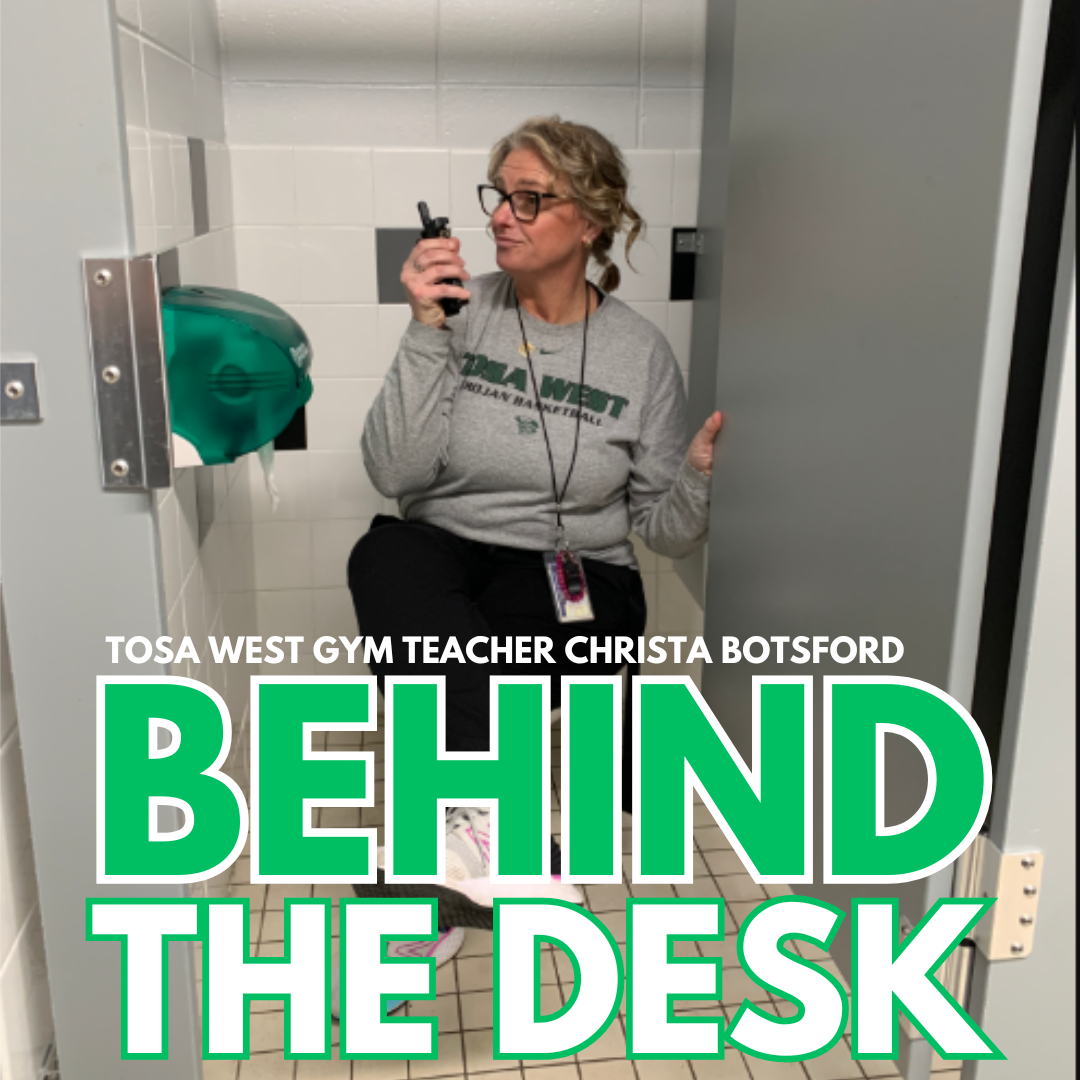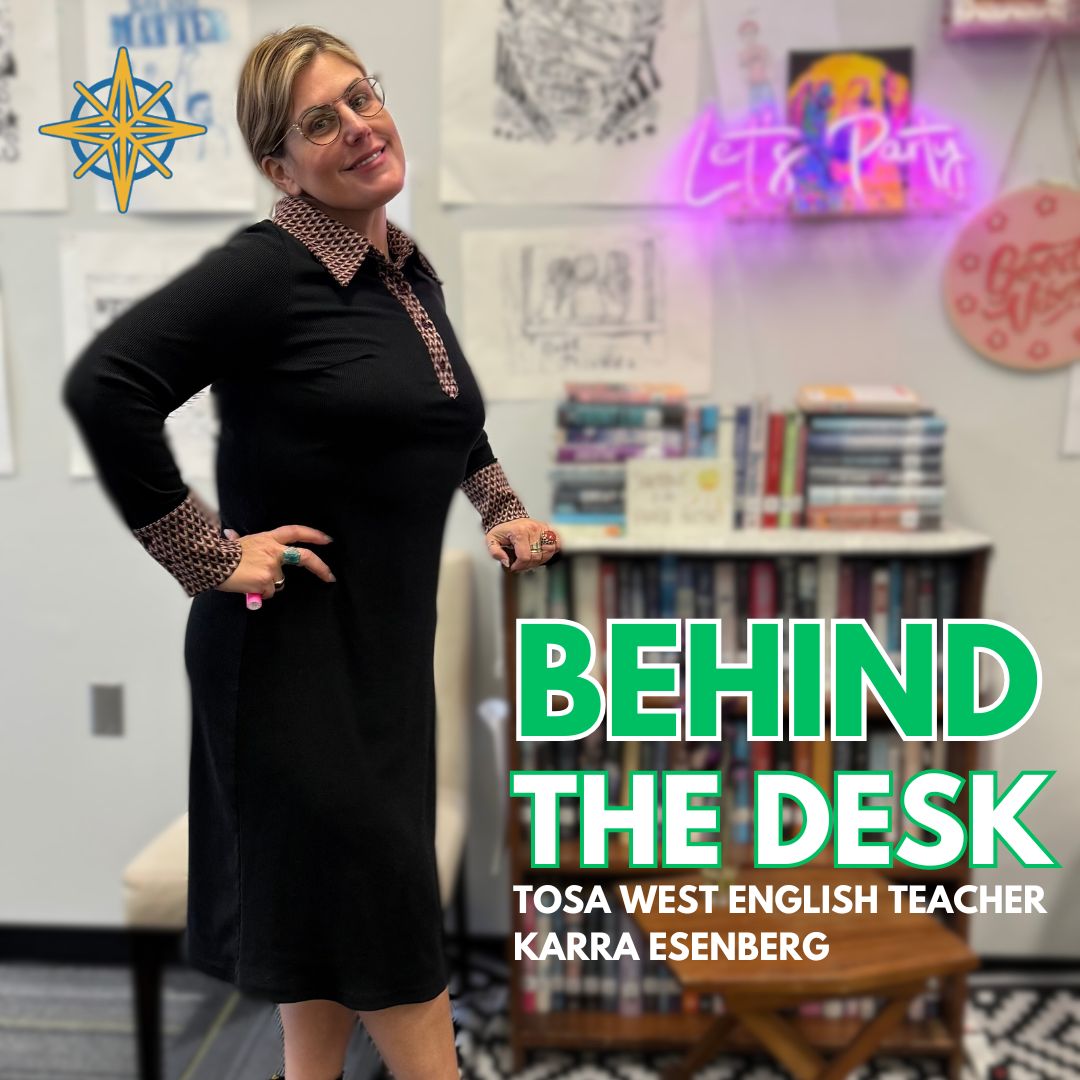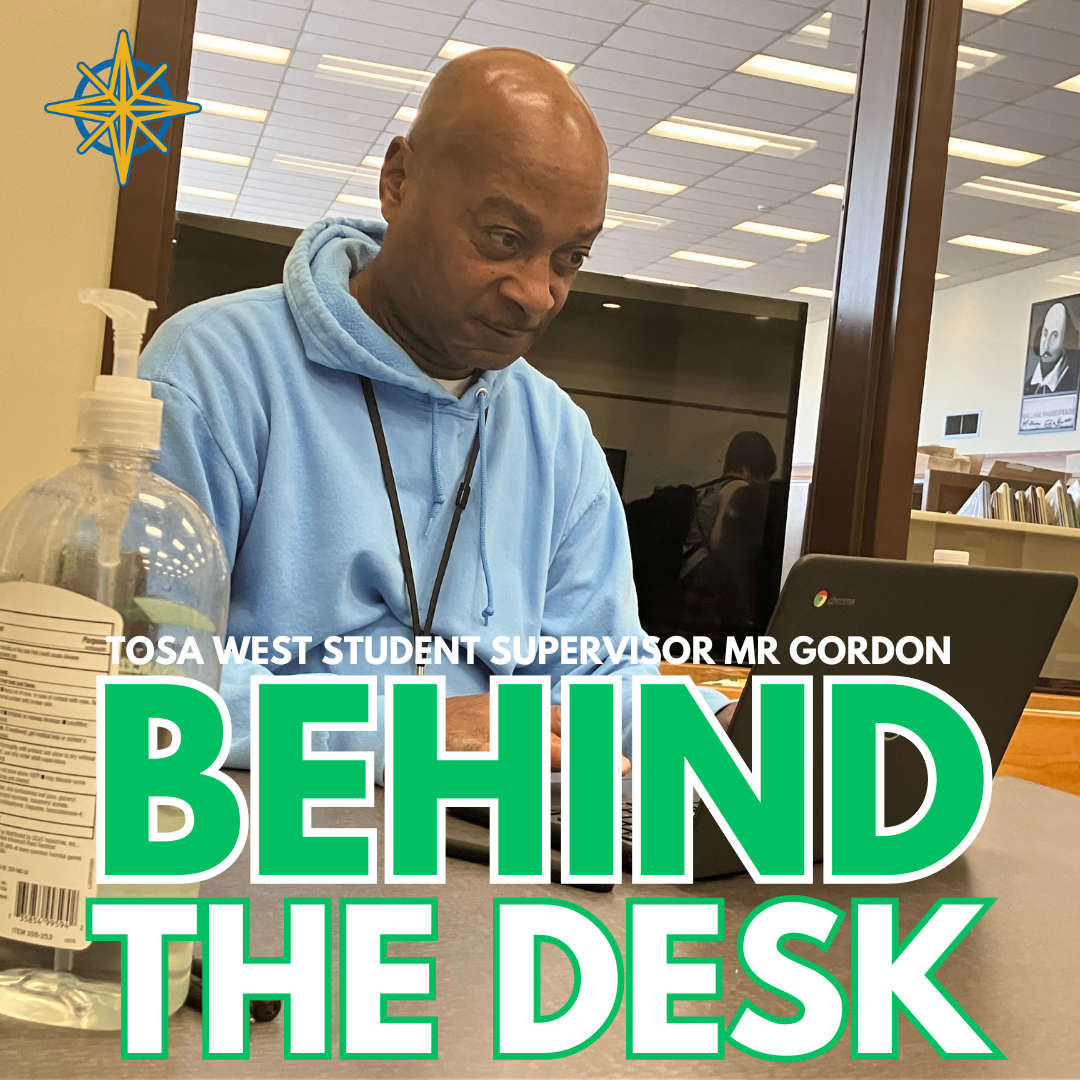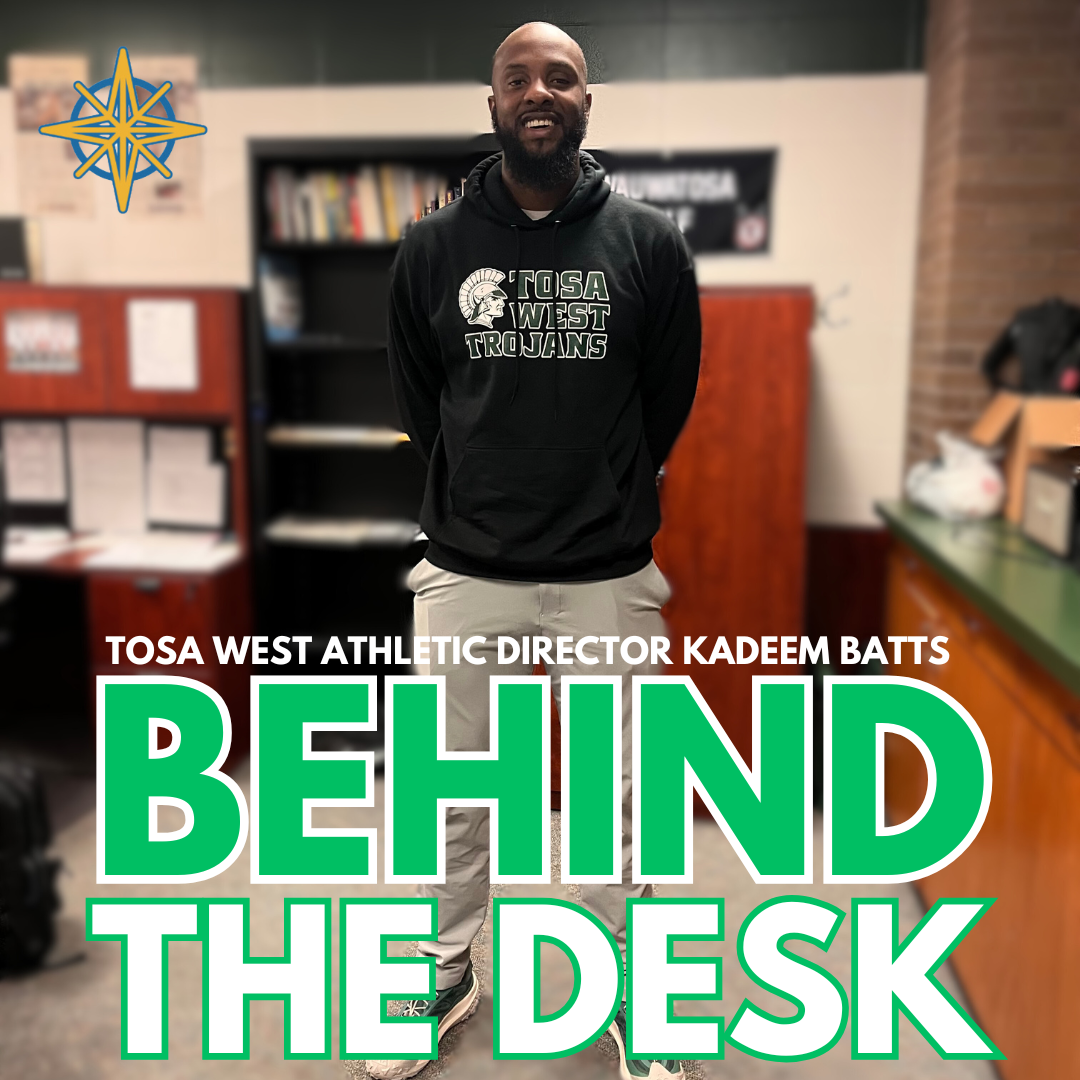What does a typical day look like for you at Tosa West?
Yes, so I get here, and I always like to make sure I have at least one cup of coffee in me because you never know what’s going to happen for the day, and then it depends on what my schedule is. But usually, kids will come in here in the morning and kind of check in before the school day starts, and maybe get a hug or two.
And then I just kind of go about my classes. And then I always do lunch duty. I like doing lunch duty because then I can get to talk to kids on a different, you know, wavelength than being in the gym. Then after lunch, usually the rest of my classes, and then get my students, my unified students, on their buses at the end of the day. And then I kind of hang here, do some grades, check out, and head home.
What is it like running events at Tosa West?
I think it’s super fun and really exciting. I like doing events like Locks for Love because it shows the positive things that are going on at West and all the amazing things that kids are sacrificing their time to set up and volunteer for. And I like good news coming out of school, so I love doing it.
And going off of that, how long have you been doing locks for love?
I was just thinking about that the other day. I know it’s been probably, like maybe, eight to 10 years or something. I think somebody else had done it before me, and then when Frank Calarco was here, he asked me to take it over. And I did then, so it’s been a little bit of a while.
You helped run multicultural fair as well, right?
Yes. Catherine Munoz, a Spanish teacher here at West. She has run it for quite a number of years. Margaret Patris used to run it here, and then when Catherine took it over, she was doing it by herself, and it’s a lot of work to put everything together. So she asked me to help her out. So she really does everything. I just do whatever she tells me to do. It’s such a cool event, because it’s not just about food and stuff which is there, which is amazing, but it’s about all the cool cultural things that our students are involved in, or parts of their culture. And it’s just another way to celebrate what goes on here at West.
Have you always been a gym teacher?
I have been—this is my 27th year, 28th year, I think. And yeah, I’ve been in Tosa my whole career. When I graduated from college, I did a long-term sub position in French in Sussex. Although I did not know a lick of French, the students actually taught me French, and I just did projects and stuff with them. It was a good experience for me. But yeah, I’ve always been a gym teacher.
Why do you believe it is important to take a gym class?
I mean, I wouldn’t say, it’s important to take a gym class. I think fitness and lifelong fitness is super important. I think nutrition is really important. And I think that finding something that you love to be active in is super important so that you take care of yourself in your life. I think health, physical health, and mental health are super important. And I think when you exercise your body, that also helps exercise your mind. And just hope that kids find a connection with something so they feel safe and comfortable in an environment where they can learn what they like and what their strengths are. Hopefully, we have an audit going up right now with our curriculum, so hopefully we can evolve our classes a little bit and make it more conducive to what students need nowadays. So we’ll be looking at those things in the next couple of months, to expand Phy-Ed classes and maybe dip a little bit more into the mental health nutrition aspect of fitness as well.
What’s it like teaching the unified PE gym class?
Oh, my God, I love it! It is like my favorite class. It’s so exciting to see neurotypical students, so students without IPS work with students that maybe don’t get the opportunity in a specially designed Phy-Ed class, because it’s only small numbers of kids in there to be able to actually play games and interact and do the activities and build relationships socially and teaching them how to do physical things with their bodies that they probably don’t think they’re capable of doing, but they are very capable. So it’s just exciting to see them interact with each other and the relationships that get built. And it’s just an amazing class. I love it.
Since you have been at West, what is one of the biggest changes you have known?
That’s a great question. You know, kids always say, “oh, kids change, kids change”. I don’t think kids change. I think adults change and I think sometimes we have to remember that, like technology and everything advances so much. I would say technology has changed a lot since I started, and social media and all of that is such a big influence on kids, and I think it’s detrimental, that’s what I see in the change. I think it hurts adults as well as students, but I think it interferes with their lives and believing in them, believing in themselves, and understanding that there’s more to life than what people post and put out there and that a lot of that isn’t reality. And that’s another thing I think that we can do better as a school and as adults, is teaching kids to understand, to be more real with things on social media, and that everything isn’t always as “peachy” as it looks. So I would say technology has really changed, and when you get older, it’s scary. Technology is scary, but I feel like I have good relationships with my kids so that they can teach me things, or like, “hey, how do I fix this?” Or “wait, what is this?”, And kids just laugh, and then they help me. But I just think we need to change the way we teach because kids are changing the way they learn. So I think that’s the biggest thing, and I think that’s just a societal thing that we have to get better at. But I wouldn’t say anything really changed. It’s what you make of it.
How do you think your teaching skills evolved after teaching during the pandemic?
Good lord, I think we were thrown to the wolves during the pandemic. And I’m a hands-on person. I’m a, you know, I want to work with kids. I want to see them. I want to know, like, is everything okay? And that was really difficult to not know how they were mentally and physically during that because we didn’t have to have your cameras on, so I couldn’t see like my students, so I felt really lost. I think it taught me to be more patient and more open-minded when it comes to teaching and understanding where kids are in their lives because their lives at home are so different than their lives here at school. So I think it made me more open-minded and more patient for kids, for learning, to find a way to connect with kids differently, typically, those that don’t like Phy-Ed. Yeah. So I think that helped me, and I hope it never happens again, because some people are really good at online learning, and it’s their jam. It’s just not my jam. It doesn’t work for me, but it was a very good life experience. I will say that.
Do you have a most memorable or favorite class or a year that you’ve taught?
Kids will be like, “Oh, come on, it better be my year”. But, you know, I feel like every year I meet new kids or different groups of students, and every year has something special in it for me. Mr. Schneider used to take a picture of his classes every single year when he taught, and then he has a photo album since the day he started teaching of all of his classes. And I’m so envious of that. Because I would love to go back and look at those pictures and think about those kids that I had so long ago. But I will say with social media, I don’t friend people, but if kids that have graduated will friend me on Facebook, and that I love following their lives and like seeing them get married and have kids and get jobs and, like, you know, being able to comment on the ups and downs in their lives and let them know that I still remember them and stuff. So I wouldn’t say there’s a favorite year group of kids. I just love seeing kids be successful in the future. I think that’s the coolest thing.








